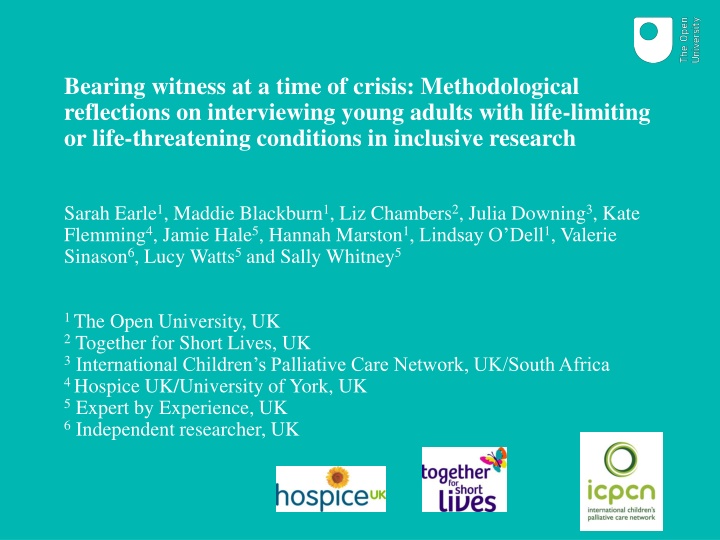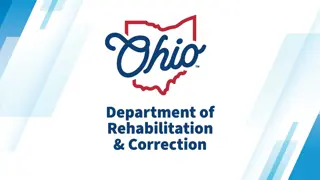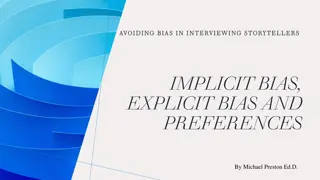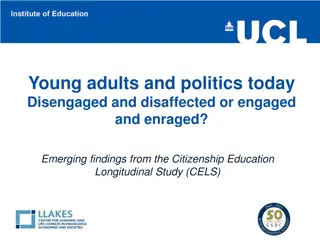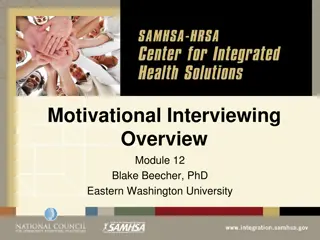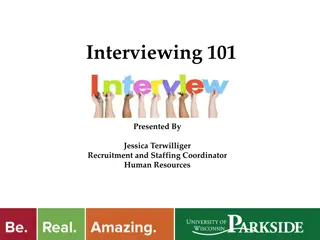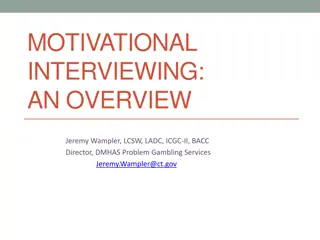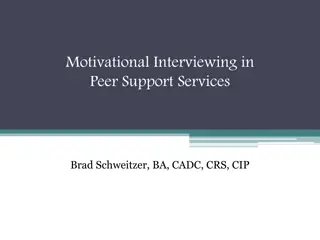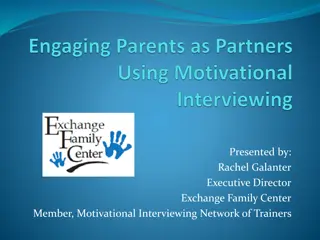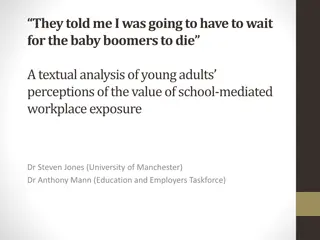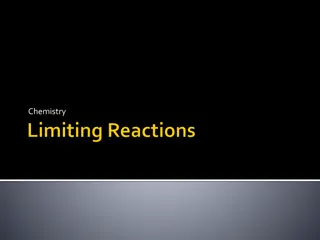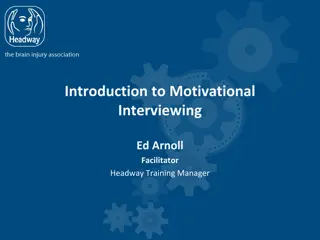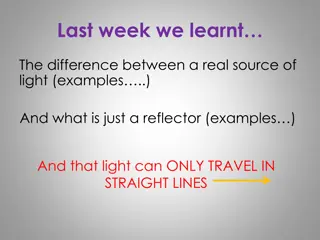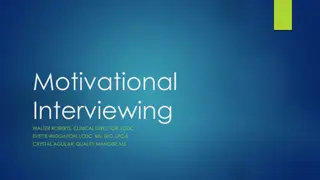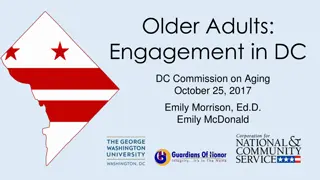Interviewing Young Adults with Life-Limiting Conditions: Methodological Reflections
This study reflects on the methodological aspects of interviewing young adults with life-limiting conditions, emphasizing inclusive research practices. The research employs interpretive qualitative methods, focusing on unexpected consequences of pandemic control measures. Participants, including both young adults and family members, highlight altruistic motives and the desire to influence positive change through their participation.
Download Presentation

Please find below an Image/Link to download the presentation.
The content on the website is provided AS IS for your information and personal use only. It may not be sold, licensed, or shared on other websites without obtaining consent from the author.If you encounter any issues during the download, it is possible that the publisher has removed the file from their server.
You are allowed to download the files provided on this website for personal or commercial use, subject to the condition that they are used lawfully. All files are the property of their respective owners.
The content on the website is provided AS IS for your information and personal use only. It may not be sold, licensed, or shared on other websites without obtaining consent from the author.
E N D
Presentation Transcript
Bearing witness at a time of crisis: Methodological reflections on interviewing young adults with life-limiting or life-threatening conditions in inclusive research Sarah Earle1, Maddie Blackburn1, Liz Chambers2, Julia Downing3, Kate Flemming4, Jamie Hale5, Hannah Marston1, Lindsay O Dell1, Valerie Sinason6, Lucy Watts5and Sally Whitney5 1 The Open University, UK 2Together for Short Lives, UK 3International Children s Palliative Care Network, UK/South Africa 4 Hospice UK/University of York, UK 5Expert by Experience, UK 6Independent researcher, UK
About the study Interpretive qualitative study using Constructivist grounded theory methodology Inclusive multi-disciplinary team Recruitment via project partners, professional and informal networks, website, social media and snowballing (following research ethics approval) In-depth guided interviews (during pandemic wave 1) (plus email-interviews) Video conferencing software audio recorded with consent and transcribed verbatim Focus on unexpected consequences of pandemic control measures Also asked questions about experience of participation in study 40 Amazon voucher as thank you for participants time
About the participants 40 people interviewed 26 young adults (14 family members) aged between 22-40 years 17 female; 9 male 18 White British/White Other; 3 British Asian; 2 Black British; 2 Mixed Race; 1 Latin American 21 England; 2 Scotland; 2 Wales; 1 N. Ireland Range of life-limiting or life-threatening conditions (incl. v rare conditions) Family members predominantly women and mothers (and predominantly of young people with associated learning disabilities)
Background and existing literature Relatively limited research on population, although growing Limited research on their experiences of participating in research Population is considered vulnerable Considered ethically problematic or challenging Powerful gatekeeping Potentially harmful, no perceived benefit to individual
Theme 1: Helping others and influencing change I found some of the questions challenging, but it is great to feel part of helping this project (Faith) Hopefully there ll be something of value that comes out of it, and maybe it ll influence some change down the line. (Bashir) Thank you for picking me, I really do like helping people. (Aesha) - Altruistic motives - Study seen as worthwhile and important - Participants wanted to help others - They wanted to influence change - They found the process uncomfortable and challenging but would have done it for free
Theme 2: Reciprocity and support I m doing this for the research I m learning something about myself and the way I process things at the same time. So it s not only benefiting the project, but it s benefiting me as a person. (Megan) When you asked me what my next plan was, I thought maybe I hadn t given it as much thought as I should have. So, yeah, that s certainly opened my eyes. (Laura) Your suggestions about respite, hospice care I ve tried in the past, but I haven t rung the local hospice and asked to speak to the director of care. I wouldn t have had that bravery, but I found it really useful. (Jasmine) Role of multi-disciplinary inclusive team Role of interpretive research and conversational in-depth interview style Participants derives personal value and reciprocity Participants were supported to problem solve
Theme 3: Therapeutic value It was hard to admit that I thought about doing myself in. my mum s got her own mental health issues and I don t want to add to what she s got to deal with. And my dad just doesn t understand any of it (Sammy) Even though I had therapy you don t necessarily talk about this breadth of stuff. So it s been useful for me as well as I m sure it s been for you hopefully. (Umendra) You obviously can t tell me what other people have been saying but is it similar? That other people have been worrying about? Making sure I m not going crazy! (Willow) Opportunity to talk rather than just getting on with things Taboo topics that would upset others Participants compared the interviews to therapy Participants spoke of opening up , feeling better and enjoying the process Wanted reassurance their experience was similar to others
Theme 4: (In)visibility and legacy The Prime Minister didn t even mention the shielded community in any of his speeches! After the first couple, we were forgotten about. Who cares about them?! They re probably all dying off anyway! (Willow) I think it s important to get as much out there in the community and in the world. If people don t know what help you need you can t expect it. (Kellie) I would say it s bitter sweet . It s uncomfortable, yes, but it s necessary . I ve got no problem with talking about it if it will help somebody else, because at the end of the day that is all I can do with my life. I can try and make sure that when I do leave this world things are a little bit better for the next generation. (Chrissie) Participants felt abandoned and ignored Othering: visible in terms of vulnerability but disposable COVID as material and existential threat Study was seen to offer focus and visibility
Conclusions Recruitment methods bypassed gatekeeping roles Inclusive multi-disciplinary team had numerous benefits Some participants found some parts of the interview uncomfortable Participants objected to being defined as vulnerable or did not define themselves as such Participants said they derived numerous benefits from involvement. They felt listened to and more valued and felt of value to people like them and society in general.
Professor Sarah Earle sarah.earle@open.ac.uk Open Thanatology The OU s interdisciplinary research group that promotes the study and education of death, dying, loss and grief across the life course Follow us on Twitter @openthanatology Website: http://wels.open.ac.uk/research/areas/death-dying-and-bereavement Contact the group: Erica.Borgstrom@open.ac.uk
